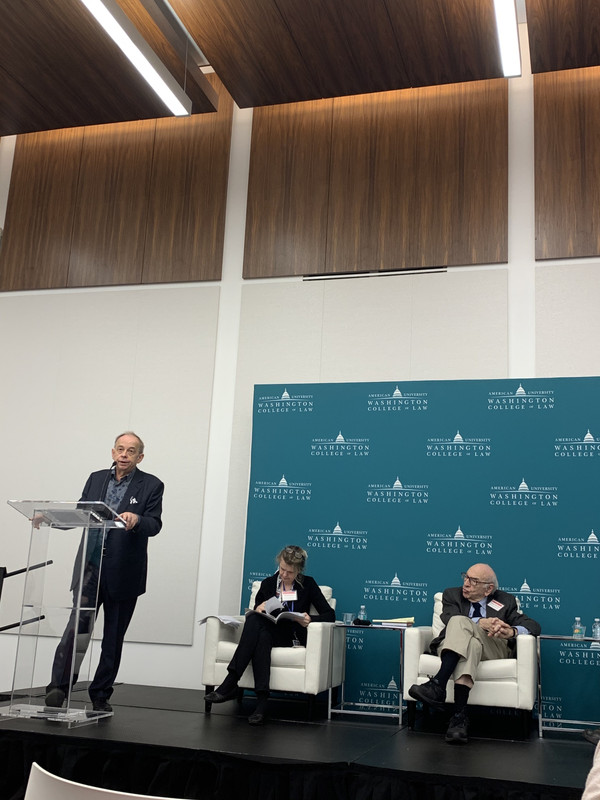AUWCL Hosts Panel Discussion on Poland's Anti-Constitutional Backslide

On February 5, American University Washington College of Law hosted the first panel discussion of the Comparative Law Initiative in Washington, DC (CLIW) on the topic of Poland’s Anti-Constitutional Backslide. The panel featured Wojciech Sadurski’s new book Poland’s Constitutional Breakdown, and provided an important critique of populism, illiberal democracy, and anti-constitutional actions.. The panelists were: Wojciech Sadurski, Challis Professor of Jurisprudence, the University of Sydney & Visiting Professor of Law at Yale Law School; Herman Schwartz, Professor of Law Emeritus at AUWCL; Mark Graber, Professor of Constitutional Law at University of Maryland Carey School of Law; and Francesca Bignami, Professor of Law at George Washington University Law School.
Professor Herman Schwartz began the panel with an introduction to the role of courts as a form of weapon in an authoritarian government. For any authoritarian government to begin to solidify its control, it first must go after the courts. Schwartz compared the changes in the last 40 years in the United States Supreme Court, which he argued has become a bastion of conservative values. The Reagan Administration and the appointment of Antonin Scalia to the Supreme Court in 1986 began the strategy of using judicial positions as a form of political power that has proven to have an enduring effect on policy decisions than that of a single legislative or presidential term. Professor Schwartz observed that the Obama Administration did not prioritize the appointment of justices across the country which allowed the Trump Administration to inherit dozens of court vacancies, including two Supreme Court appointments. This has effectively enabled the Supreme Court to make increasingly conservative court decisions and will ultimately affect the United States far past Trump’s own term.
Moving to the European context, Professor Francesca Bignami spoke on the European Union and its role in controlling its member states when one state shifts away from liberal ideals enshrined in its Treaty. In the case of Poland, the authoritarian party currently in power appeared so fast that the opposition had little time to react and combat the unconstitutional changes enacted. Within a few months, the Polish Law & Justice Party managed to capture the courts through court-packing tactics, provided the media with greater access to the leading party while simultaneously slashing access to the opposition party and its protests, and shifted federal funding towards conservative organizations such as churches. She highlighted three tools the EU can choose from to try and fight the growing authoritarian regime within Poland:
- Bring Poland before the European Court of Justice. This tactic has proven to have little effect, as Poland has been increasingly recalcitrant towards outside attempts at influence.
- Make EU funding conditional on the maintenance and enforcement of rule of law. Poland receives a large portion of EU funding, and Bignami argues that this could be an effective strategy as it would directly affect and influence the voting blocs within Poland.
- Suspend Poland’s voting rights under Article 7 of the EU Treaty. Poland and its people are very pro-EU, and very weary of Putin’s Russia. A public expulsion of Poland is an intimidating prospect and vulnerability for the party.
Professor Mark Graber discussed populism and its role in the breakdown in Poland. Graber questioned the fundamental notion of constitutional breakdown that leads to the growth of authoritarianism: is the design of the Polish Constitution itself a vulnerability? Graber argued, before dismantling the mere idea of populism as is the typical approach, that we should think critically on the ideas that populists represent. Populists tend to be pro-union and support direct elections. Graber suggested that while the court system can be our saviors, we should think more on what these courts represent. Oftentimes courts are packed with elite scholars representing elite institutions, and could be seen as missing or not representing the values of the average citizen. Populism is foundationally the idea of organizing people and giving them an identity to reinforce certain portions of law or ideals that most matter to that particular group. He argued for less imitation of Earl Warren’s judicial strategies, and more of Abraham Lincoln’s organization tactics.
Finally, Professor Wojciech Sadurski, author of Poland’s Constitutional Breakdown, offered a critical analysis of each panelist’s remarks, and an overview on Poland’s strategy towards reaching authoritarianism in less than a decade. In Sadurski’s view, Poland used the judicial system as an enabler to the government through illegal court-packing strategies, and persecuted common court judges who complained about the lack of independence of courts, with the ultimate goal of controlling the judiciary, the only branch of government outside the direct control of the party leader.